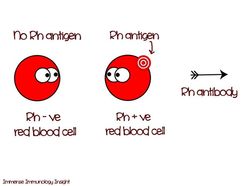What's your blood type?
 The Rh-antigens classify people into Rh-positive or Rh-negative groups, and each of us acquires a pair of Rh-controlling genes from our parents (one from father and one from mother).
The Rh-antigens classify people into Rh-positive or Rh-negative groups, and each of us acquires a pair of Rh-controlling genes from our parents (one from father and one from mother).
The Rh-negative individuals have 2 Rh-negative genes presented in their DNA, resulting in no Rh-antigens on the red blood cells. On the other hand, the Rh-positive gene is dominant over the negative one: if one or two Rh-positive genes are presented, that person will be Rh-positive. The persons with 1 Rh-positive gene & 1 negative gene are called carriers, for they can pass on the Rh-negative gene despite being Rh-positive. A carrier parent has a 50:50 chance of giving his or her child a Rh-positive or negative gene.
If both parents are such carriers, what is the chance that their child will be a carrier, too?
This section requires Javascript.
You are seeing this because something didn't load right. We suggest you, (a) try
refreshing the page, (b) enabling javascript if it is disabled on your browser and,
finally, (c)
loading the
non-javascript version of this page
. We're sorry about the hassle.
In genetics, this is a very common question about autosomal recessive genes, where the affected babies (Rh-negative in this case) acquire the affecting genes from each of their parents. From the diagram above, we can see that a carrier parent can either give his or her child a Rh-positive or negative gene, each having a chance of 50%.
With 2 choices of Rh+ and Rh- from both parents, we come up with 4 different permutations: Rh+Rh+, Rh+Rh-, Rh-Rh+, and Rh-Rh-.
Since a carrier has 1 Rh-positive and 1 negative gene, 2 out of 4 outcomes fit the criteria.
Thus, the chance of bearing a carrier child = 2/4 = 50%.
Bonus: the chance of bearing a Rh-negative child = 1/4 = 25% (in case you're wondering).